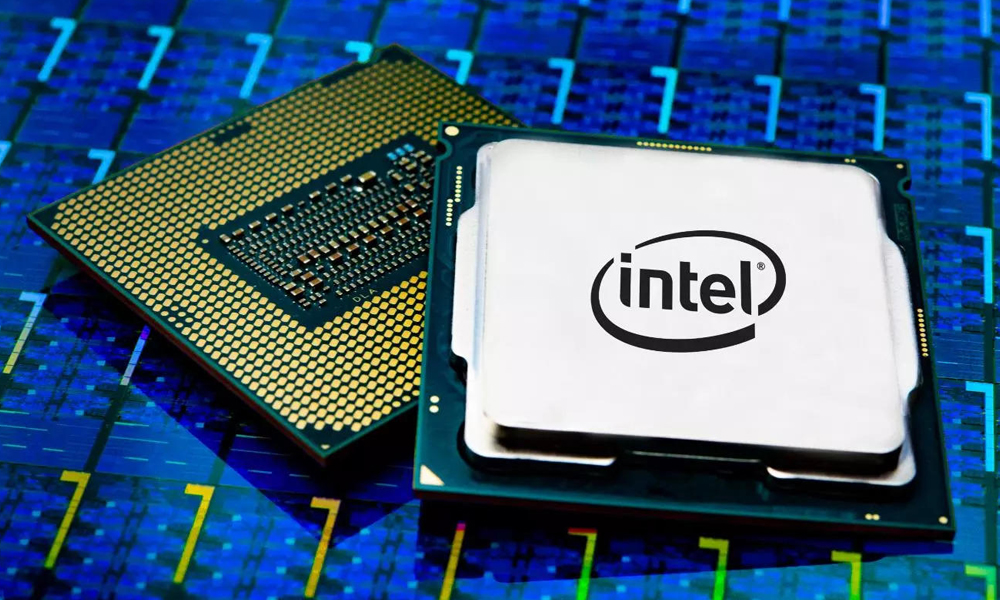Science & Technology
Intel plans $20 bln chip manufacturing site in Ohio – sources

Intel Corp on Friday is set to announce it will invest $20 billion in a massive new manufacturing site near Columbus, Ohio to develop and manufacture advanced semiconductor chips, sources briefed on the matter told Reuters.
The planned investment includes 3,000 permanent jobs on the 1,000-acre site in New Albany, Ohio. Time magazine, which first reported the news, said Intel will build at least two semiconductor fabrication plants.
President Joe Biden is making remarks Friday on the U.S. government’s efforts “to increase the supply of semiconductors, make more in America, and rebuild our supply chains here at home,” the White House said earlier.
Intel Chief Executive Pat Gelsinger is set to appear with Biden on Friday at the White House, sources told Reuters. The White House did not respond to a request for comment.
The initial $20 billion is the first step of what could be an eight-factory complex costing tens of billions of dollars.
Intel declined to comment on its plans but said in a statement that Gelsinger would disclose details Friday of “Intel’s latest plans for investment in manufacturing leadership” as it works “to meet the surging demand for advanced semiconductors.”
Chipmakers are scrambling to boost output after manufacturers around the world, from autos to consumer electronics, faced shortages of chips. Intel also is trying to win back its position as maker of the smallest and fastest chips from current leader TSMC , which is based in Taiwan.
Gelsinger last fall also said he planned to announce another U.S. campus site before the end of the year that would eventually hold eight chip factories.
He told the Washington Post the complex could cost $100 billion over a decade and eventually employ 10,000.
Gelsinger is driving Intel plans to expand, especially in Europe and the United States, as it seeks to heat up competition with global rivals and respond to a worldwide microchip shortage.
Intel and Italy are intensifying talks over investments expected to be worth around 8 billion euros ($9 billion) to build an advanced semiconductor packaging plant, Reuters reported late last year.
The Biden administration is making a big push to convince Congress to approve $52 billion in funding to dramatically increase chip production in the United States. The Senate in June voted 68-32 for the chips funding as part of a broader competitiveness bill, but it has been stalled in the House.
House Speaker Nancy Pelosi said Thursday she hopes to “go to conference” on the chips funding measure soon.
Still, Intel’s plans for new factories will not alleviate the current demand crunch, because such complexes take years to build. Gelsinger previously said he expected the chip shortages to last into 2023.
In September, Intel broke ground on two factories in Arizona as part of its turnaround plan to become a major manufacturer of chips for outside customers. The $20 billion plants will bring the total number of Intel factories at its campus in the Phoenix suburb of Chandler to six.
Intel told Time it considered 38 sites before picking New Albany, Ohio in December. Ohio has agreed to invest $1 billion in infrastructure improvements to facilitate the factory, Time said.
Science & Technology
Global cyber outage grounds flights and disrupts businesses

A global tech outage was disrupting operations in multiple industries on Friday, with airlines halting flights, some broadcasters off-air and everything from banking to healthcare hit by system problems.
American Airlines (AAL.O), Delta Airlines (DAL.N), United Airlines (UAL.O), and Allegiant Air (ALGT.O), grounded flights citing communication problems. The order came shortly after Microsoft (MSFT.O), said it resolved its cloud services outage that impacted several low-cost carriers, though it was not immediately clear whether those were related, Reuters reported.
“A third party software outage is impacting computer systems worldwide, including at United. While we work to restore those systems, we are holding all aircraft at their departure airports,” United said in a statement. “Flights already airborne are continuing to their destinations.”
Australia’s government said outages suffered by media, banks and telecoms companies there appeared to be linked to an issue at global cybersecurity firm Crowdstrike (CRWD.O).
According to an alert sent by Crowdstrike to its clients and reviewed by Reuters, the company’s “Falcon Sensor” software is causing Microsoft Windows to crash and display a blue screen, known informally as the “Blue Screen of Death”.
The alert, which was sent at 0530 GMT on Friday, also shared a manual workaround to rectify the issue.
A Crowdstrike spokesperson did not respond to emails or calls requesting comment.
There was no information to suggest the outage was a cyber security incident, the office of Australia’s National Cyber Security Coordinator Michelle McGuinness said in a post on X.
The outages rippled far and wide.
The travel industry was among the hardest hit with airports around the world, including Tokyo, Amsterdam, Berlin and several Spanish airports reporting problems with their systems and delays.
International airlines, including Ryanair (RYA.I), Europe’s largest airline by passenger numbers, warned of problems with their booking systems and other disruptions.
In Britain, booking systems used by doctors were offline, multiple reports from medical officials on X said, while Sky News, one of the country’s major news broadcasters was off air, apologising for being unable to transmit live.
Banks and other financial institutions from Australia to India and South Africa warned clients about disruptions to their services, while LSEG Group (LSEG.L), reported an outage of its data and news platform Workspace.
Amazon’s AWS cloud service provider said in a statement that it was “investigating reports of connectivity issues to Windows EC2 instances and Workspaces within AWS.”
It was not immediately clear whether all reported outages were linked to Crowdstrike problems or there were other issues at play.
Science & Technology
Samsung unveils exclusive Galaxy Z Flip6 Olympic Edition for Paris 2024 athletes

Samsung Electronics Co., Ltd., a Worldwide Olympic and Paralympic Partner, this week revealed the Olympic Edition of its newly announced Galaxy Z Flip6, exclusively designed and customized for all athletes competing at the upcoming Olympic and Paralympic Games Paris 2024.
The Galaxy Z Flip6 Olympic Edition for Paris 2024 is the first-ever Olympic Edition to feature Galaxy AI.
Designed to elevate the athletes’ Games-time experience from the moment they arrive in Paris, it is the first to come pre-loaded with a full suite of exclusive services and useful apps.
In addition, it marks the first time Samsung’s newest product is being made available to athletes before its official market launch. The Galaxy Z Flip6 will also take center stage at the Olympic Games as the first Olympic Edition to play an integral role on the podium.
It boasts the new Galaxy Z Flip6’s compact and versatile design, in a striking yellow colorway adorned with the Olympic rings and Paralympic agitos in gold.
To dress up the phone, Samsung partnered with the Parisian Men’s Luxury Maison, Berluti, who designed the Team France’s official outfits for the Paris 2024 Opening Ceremony, to create an exclusive Flipsuit Case that will accompany each device. Made from Venezia leather, each Flipsuit Case has a unique patina featuring a vibrant color mix inspired by the Olympic rings, celebrating the Olympic spirit and values of excellence and unity.
“Samsung has pushed the boundaries of mobile technology in support of the Olympic and Paralympic Games and its athletes for nearly three decades,” said Stephanie Choi, EVP & Head of Marketing of Mobile eXperience Business at Samsung Electronics.
“We are honored to deliver our newest Galaxy innovation to the inspiring athletes of Paris 2024 — and give them the opportunity to experience the powerful and intelligent Galaxy Z Flip6 firsthand, even before its official market launch. We are excited to see how our technology opens up athletes’ Games-time experience like never before — from creating meaningful connections, to sharing and capturing lifelong memories while in Paris and beyond.”
The Galaxy Z Flip6 Olympic Edition includes a range of useful innovations to help athletes .
Among these is live translation of calls. This translates phone calls directly on the device in real-time into 16 different languages, making it easy for athletes to call the Olympic hotlines and local contacts in their native language.
It also instantly translates live conversations, allowing athletes to chat with other athletes and volunteers and receive a live translation of what they’re saying on screen – while still speaking face-to-face.
It also helps to draft emails and social media posts in apps by using simple keywords and it allows athletes to record, share and analyze their performances in slow motion.
Additionally, to keep track of the latest Games-time schedules and travel around the Olympic venues with ease, several official International Olympic Committee (IOC) apps such as Athlete 365,6 Olympic Shop, Paris 2024, Transport Accred App, and IOC hotline will be pre-loaded.
When and how to watch the games.
Ariana Television Network (ATN) has secured the exclusive rights to broadcast the Olympic Games in Afghanistan.
The global sporting event gets underway on 26 July and will run through until 11 August 2024.
Fans in the country will be able to tune in to Ariana Television to watch the event.
Science & Technology
China leads the world in adoption of generative AI, survey shows
The SAS report also said China led the world in continuous automated monitoring (CAM), which it described as “a controversial but widely-deployed use case for generative AI tools”.

China is leading the world in adopting generative AI, a new survey shows, the latest sign the country is making strides in the technology that gained global attention after U.S.-based OpenAI’s ChatGPT launched in late 2022, Reuters reported.
In a survey of 1,600 decision-makers in industries worldwide by U.S. AI and analytics software company SAS and Coleman Parkes Research, 83% of Chinese respondents said they used generative AI, the technology underpinning ChatGPT.
That was higher than the 16 other countries and regions in the survey, including the United States, where 65% of respondents said they had adopted GenAI.
The global average was 54%, read the report.
The industries surveyed included banking, insurance, healthcare, telecommunications, manufacturing, retail and energy.
The results underscore China’s rapid progress in the generative AI field, which gained momentum after Microsoft-backed OpenAI released ChatGPT in November 2022, prompting dozens of Chinese companies to launch their own versions.
Last week, a report by the United Nations’ World Intellectual Property Organization showed China was leading the GenAI patent race, filing more than 38,000 between 2014 and 2023 against 6,276 filed by the United States in the same period.
While many leading international generative AI service providers, including OpenAI, face curbs in China, the country has developed a robust domestic industry, with offerings from tech giants such as ByteDance to startups such as Zhipu.
Enterprise adoption of generative AI in China is expected to accelerate as a price war is likely to further reduce the cost of large language model services for businesses, Reuters reported.
The SAS report also said China led the world in continuous automated monitoring (CAM), which it described as “a controversial but widely-deployed use case for generative AI tools”.
This technology can collect and analyze vast amounts of data on users’ activities, behaviour and communications, which can lead to privacy infringements as they are not aware of the extent of the data being collected or how it is used, said Udo Sglavo, vice president of applied AI and modelling at SAS.
“The algorithms and processes used in CAM are often proprietary and not transparent,” Sglavo added.
“This can make it difficult to hold the entities using CAM accountable for misuse or errors.”
He added, “China’s advancements in CAM contribute to its broader strategy of becoming a global leader in artificial intelligence and surveillance technologies.”
-

 Sport4 days ago
Sport4 days agoOlympics finally here; What you need to know
-

 Latest News5 days ago
Latest News5 days agoOCHA reports 110 die in landmine explosions in Afghanistan every month
-

 Regional5 days ago
Regional5 days agoChina braces for twin tropical cyclones after deadly flash floods
-

 Health4 days ago
Health4 days agoHealth partners provide services 589,205 people in Afghanistan in last month
-

 Latest News4 days ago
Latest News4 days agoAfghanistan’s Hajj ministry confirms death of 27 pilgrims in Mecca and Medina
-

 Business5 days ago
Business5 days agoConference on Islamic microfinance kicks off in Kabul
-

 Sport4 days ago
Sport4 days agoACB proposes ODI fixtures against top-tiered teams
-

 Latest News4 days ago
Latest News4 days agoIslamabad claims three terrorists killed at Pakistan-Afghanistan border

























